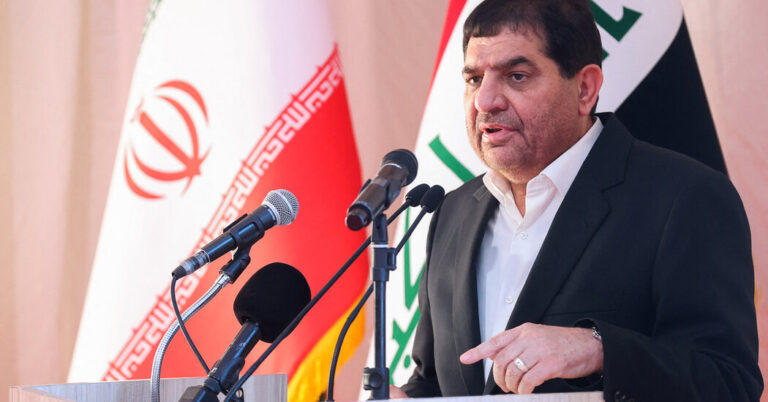With the death of President Ebrahim Raisi, Iran’s first vice president, Mohammad Mokhber, becomes interim president. Mr. Mokhber is a conservative political operative with a long history of involvement in large business conglomerates closely linked to Iran’s supreme leader, Ayatollah Ali Khamenei.
In a statement Monday, Mr. Khamenei said Mr. Mokhber must work with legislative and judicial leaders to hold elections for a new president within 50 days.
In Iran, vice presidents generally keep a low profile, operating more as players within the government than as public figures.
“Iranian vice presidents are not traditionally contenders to succeed their bosses,” said Robin Wright, a joint research fellow at the U.S. Institute of Peace and the Wilson Center in Washington. “The biggest question,” she added, “is who the regime will allow to run for office.”
Mr. Mokhber is around 68 years old and became first vice president in August 2021. He is from the Khuzestan province in southwestern Iran, bordering Iraq and the Persian Gulf. He was deputy governor there and, during the Iran-Iraq war in the 1980s, he was a member of the Revolutionary Guards’ medical corps.
One of Mr. Mokhber’s rare high-level appearances came when he and three other senior Iranian officials visited Moscow in 2007. October 2022 to finalize a sale of Iranian drones and ballistic missiles to Russia, intended for use in the war in Ukraine.
Mr. Raisi chose him as vice president after Mr. Mokhber held senior positions in some of Iran’s most powerful organizations, including the Mostazafan Foundation, Bank Sina and Setad, a conglomerate entirely controlled by the ‘Ayatollah Khamenei who has billions of dollars in assets and has been involved in—not entirely successfully—in efforts manufacture and distribute a vaccine against Covid-19.
The three organizations are part of an opaque network of financial entities linked to the Iranian state, even though they are not directly owned by the state. They are also linked to priority projects for the supreme leader and his entourage.
Mr. Mokhber’s involvement suggests that he has been a successful behind-the-scenes player, familiar with financing networks important to Iran’s official power structure.
The Mostazafan Foundation, where Mr Mokhber worked in the early 2000s, is officially a charity but is described by the US Treasury as “a key patronage network for the supreme leader” that includes stakes in key sectors of the Iranian economy, including finance, energy, construction and mining. It is subject to sanctions by the US Treasury because it is controlled by Mr Khamenei, and the Treasury said it was created in part “to confiscate and manage assets, including those belonging to the origin to religious minorities” in Iran, notably Bahais and the Jews.
Treasury says the foundation funnels some of its money to individuals and Islamic Revolutionary Guard Corps entities that have been involved in terrorism and human rights abuses.
Bank Sina was confronted punishments by the US Treasury and the European Union to funding Iran’s nuclear and ballistic missile program.
Mr. Mokhber appears to have risen to the top of Iran’s political leadership in part thanks to the close relationship he developed with Iran’s supreme leader, dating back to at least 2007, when he joined Setad’s leadership. A few months after his appointment at Setad, Mr. Mokhber founded the Barakat Foundation, which has a number of companies under its umbrella, including a major Iranian medical and pharmaceutical company.
Although his relationship with the supreme leader will be important during the run-up to the election, analysts say a much larger group of senior officials around Mr. Khamenei will determine how this sensitive period in Iran will be handled.
“The regime is at a turning point – political, economic and even military,” Ms. Wright said, emphasizing Iran’s large-scale air attack on Israel last month, that information was almost entirely intercepted, in what she called a “humiliating failure.” Low turnout in March legislative elections It was also a sign of trouble for the Iranian theocracy, she added.
“He is very nervous about his future and the sustainability of his core ideology,” she said.
Leily Nikounazar reports contributed.


